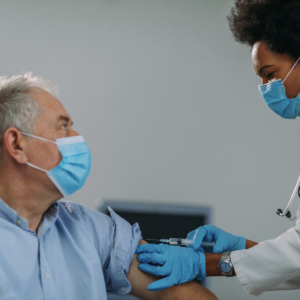Covid Counseling: Updated Recommendations Regarding Covid

Covid Counseling: Updated Recommendations Regarding Covid
March 6, 2024
It’s been less than 2 months since our previous post on Covid and yet, in that short time, several new recommendations have surfaced about vaccinations and isolation if you become infected. These are important new pronouncements, as Covid is not going anywhere, so the better we can address and respond to it, the better for us all. While hospitalizations and deaths due to Covid are down dramatically since the winter of 2022, in the year that just passed, over 900,000 people were hospitalized with COVID-19 and over 75,000 deaths were attributed to Covid around the country, numbers that far surpass a typical flu season. Covid clearly causes more serious illness than the flu, and especially for those at higher risk (particularly older adults who have an underlying disease or immune suppression), becoming sick with Covid is no walk in the park. At this point, roughly 20,000 people a week in the US are being hospitalized due to COVID-19, and about 2000 deaths each week result from COVID-19. Those who are over 75 are considered at greatest risk for hospitalization and death, which is concerning given that only about 40% of adults 65 and older are currently up-to-date on their COVID-19 vaccines.
This brings us to the first important update for older adults regarding COVID-19. A CDC Advisory Panel has just recommended that adults 65 and older should get another Covid booster shot this spring. This recommendation for a follow-up booster to the new vaccine offered last fall is already in place in Canada and the UK. It comes amidst growing recognition that Covid is not quite seasonal, the way the flu is (which only requires a vaccination in the fall), and that older adults continue to remain most at risk for serious illness. If you were smart enough to get a vaccine last fall (or were stricken with Covid sometime since September of 2023), your immunity to Covid has likely waned so that you are once again more vulnerable to infection. Experts recommend that you receive the new booster (which is the same vaccine you would have received last fall) no sooner than 4 months from your previous vaccination or your most recent bout of Covid (however, those who are immunocompromised should discuss with their physician whether an accelerated booster schedule is appropriate). Because there may be a new vaccine for Covid next September (as the virus keeps mutating) it’s best if you receive your booster no later than June.
The other major CDC recommendation that was just announced addresses the isolation period that’s been previously recommended if you become infected with COVID-19. According to new CDC guidelines, the previous recommendation that you isolate for 5 days once infected with COVID-19 is no longer necessary. The new guidance suggests that once you no longer have a fever for 24 hours (without using medication), and your symptoms are improving, you can return to your usual activities, though it is advised that you still take precautions such as masking in indoor, crowded places, hand washing, and keeping your distance from those who may be at enhanced risk (such as older adults or those immunocompromised). These recommendations are not only for COVID-19 but also for those who have the flu or RSV. While there are arguments that this guidance is faulty because it treats COVID akin to the flu, when in fact COVID-19 can be a much more serious infection, the CDC is trying to strike a balance between guidance that protects those who are vulnerable and instructions to the general public that are easy to remember and follow. These recommendations do not apply to health care facilities or nursing homes, and there’s nothing to prevent you from isolating longer if you feel unwell or are worried about infecting others (though there may be pressure from employers who insist longer isolation is no longer necessary). What’s also important to remember is that this is not an exact science. You may be infectious before you have symptoms, you may never have a fever or you may shed virus even after a fever has dissipated. What this perhaps underscores, then, is that all of us would benefit from being vaccinated to reduce our risks and that public health measures such as wearing a well-fitting mask and washing hands may be valuable tools of protection even if you haven’t recently had Covid, as you may never know for certain when you are being exposed (especially if you fall into one of the more vulnerable categories).
One other thing to remember. If you do become ill with COVID-19, there is an effective anti-viral, Paxlovid, that can drastically cut your risk of serious illness if taken in the first few days of becoming sick. Research has confirmed the real value of using Paxlovid, although as previously noted, few people actually use it. If you’re hoping to access Paxlovid but having trouble due to the costs, click here to find out about a program that should give you affordable or even free access to Paxlovid.







